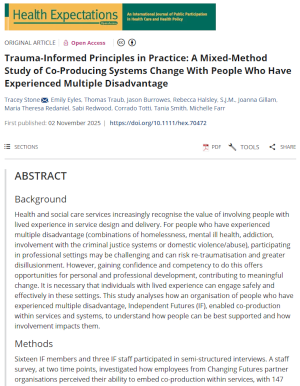Evaluating how people with lived experience of multiple disadvantage can improve services
6 November 2025
Working alongside people with lived experience of multiple disadvantage to improve services can have multiple benefits, according to a new study published in Health Expectations. Multiple disadvantage includes homelessness, poor mental health, substance use, domestic abuse and contact with the criminal justice system.
However, people need the right support and organisations need to have resources, capacity and commitment to make the right changes.
The study was conducted by ARC West staff in collaboration with Changing Futures Bristol and funded by the NIHR Three Research Schools Mental Health Practice Evaluation Scheme.
The team looked at Independent Futures, a group of people with lived experience of multiple disadvantage, which was part of the UK Government-funded Changing Futures Bristol programme. Independent Futures supported local and national work to improve services for people with multiple disadvantage.
Researchers carried out 16 interviews with lived experience representatives and three staff who directly supported them. They also surveyed 117 staff members to understand how they involved people with lived experience.
The team worked alongside people with lived experience and staff. Together they explored how involving people with lived experience of multiple disadvantage in the services and systems that support them could improve services and create better experiences for everyone.
The team found that Independent Futures modelled trauma-informed practice and helped influence systems change in different areas. Independent Futures’ trauma-informed approach facilitated lived experience members’ personal growth, improved confidence and some work skills. Members contributed to 65 different workstreams.
However, embedding this involvement into wider services and systems can be challenging. Staff survey comments highlighted resources, time and hierarchical cultures as obstacles.
At the end of the study, Independent Futures had to change due to uncertain short-term funding and the need to connect with other lived experience groups. Developing an alliance of lived experience groups is now helping to share learning across organisations to enable best practice.
The article concludes that everyone needs to adopt and commit to trauma-informed principles to make lived experience involvement work. This requires flexibility, openness and willingness, making sure principles like trust, transparency, empowerment, choice and safety inform people’s everyday actions.
Dr Tracey Stone, Senior Research Associate at NIHR ARC West, said:
“I thoroughly enjoyed working in real partnership with the Independent Futures members and staff. This enriched, contextualised and improved the robustness of our findings no end.
“I learned a great deal as an individual and as a researcher. Trauma-informed principles in action was the subject of the study but this also permeated the research process with trust, keeping us all safe, heard and respected. It’s not surprising that the most authentic responses in interviews emerge under these conditions.”
Rebecca Halsley, from Independent Futures, said:
“I was able to become an Independent Futures member because of the trauma-informed approach. Surprisingly, I quickly felt comfortable and although I was mute, I was accepted.
“During my time with Independent Futures I gained confidence, felt valued and I was supported to find my voice and get involved in workstreams. My negative experiences contributed to positive change – that’s empowering. Independent Futures helped me get my life back on track and for me, it has been the springboard back into paid employment.”
Paper
